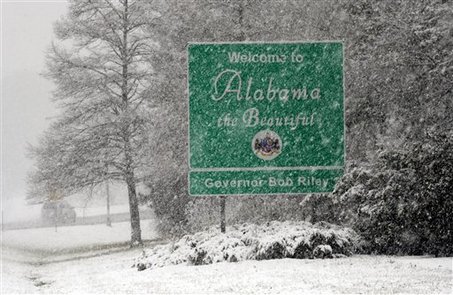Below are tips the Birmingham Water Works Board (BWWB) suggests customers use in preparing their homes during the cold weather and freezing temperatures.
Tips for Protecting Pipes
- To prevent frozen pipes, the BWWB recommends letting your hot and cold faucets drip overnight, and opening cabinet doors to allow heat to reach uninsulated pipes under sinks on exterior walls.
- Locate the water shut-off valve in your home in advance of a water emergency, so you know where to go if a pipe bursts.
- Disconnect garden hoses and, if practical, use an indoor valve to shut off and drain water from pipes leading to outside faucets.
- If you’re going away for an extended period of time, be sure to maintain adequate heat inside your home at no lower than 55 degrees.
- Don’t place a space heater within three feet of anything combustible.
- Program your local utility contact information into your cell phone now, before you need them.
Tips to prevent water pipes and plumbing from freezing at your home or business:
- Check your property for all exposed pipes that carry water. This includes outdoor faucets, bibs and valves.
- Use foam or wrap insulation (available from plumbing supply and home improvement stores) to protect pipes from freezing. Inspect your existing insulation, especially in areas that are exposed to the elements.
- Temporary insulation (towels, blankets, newspaper, etc.) is better than nothing.
- Seal all areas that allow cold outside air to get in where pipes are located.
- Newer homes may have poly piping in the attic which may also need to be insulated.
- Remove, drain and store outdoor hoses inside.
- Consider letting cold water drip from a faucet during times of extremely frigid temperatures.
- If your dishwasher has a timer on it, consider loading it and programming the cycle for the time of night prior to temperatures dropping below freezing. Similar efforts can be made with indoor washing machines, though these may require a manual start.
Tips to protect your irrigation system:
- Consult your owner/operator manual for how to “winterize” your irrigation system.
- Insulate the main shut-off valve. Note: If there is none, consider installing a valve as a preventative investment.
- Insulate all above-ground lines and piping.
- Consider whether you wish to shut down automatic controller/timer and shut off water supply to system. This may include draining remaining water and reprogramming operations.
- Consult your owner/operator manual.
Tips for frozen pipes:
- Be patient. There is no quick remedy.
- Any area that is exposed is the likely point where a freeze took place. There may also be more than one frozen spot.
- Pipe(s) will need to gradually warm up. Use something to blow warm air (such as a hair dryer or vacuum cleaner canister) on the frozen section to begin the warming process. Wave the warm air back and forth on the pipe. Keep a faucet in your home in the ‘on’ position during thawing to prevent a slug of water from going through and causing more damage.
- Do not pour hot water over a frozen pipe or do anything that would cause a rapid rise in temperature (the difference in degrees between that of the frozen pipe and the material used to try to thaw it).
- Do not use open flame torches to thaw due to risk of fire or further damage to pipes.
- If there is a burst or water is already leaking from plumbing, turn off the water at the main supply valve to the home or business.
Remember: When you wrap pipes, the water will be cooler in the summer months and warmer in the winter months. You are also conserving water because its running time is now lessened before it reaches the desired temperature.
If you have to turn off the water to your home or business, do so at the shut-off valve, not at the water meter.
If you need the water meter valve turned off, call the BWWB’s Customer Service at (205) 244-4000. Learn where your shut-off valve is located in case you need to turn off the water in an emergency situation.
Locate your water meter. Most are located at the front of a home or business near the sidewalk or at in the rear, such as an alley.
Remove the lid. Behind the meter, on the side closest to your home or business, you should find either a gate valve or a ball valve. To close a gate valve, turn to the right; to close a ball valve, turn 1⁄4 of the way to the right.
If you cannot see or turn the valve, call the BWWB. We will respond as soon as staff is available. Call our Customer Service number at (205) 244-4000.
Call a plumber for assistance if the break is on your property (between the meter and your home or business or if inside your home or business).
Sources: Environmental Protection Agency and various water utilities.
The Birmingham Water Works serves 600,000 people in Jefferson, Shelby, Blount, St. Clair and Walker counties. For more information about your Birmingham Water Works Board, please call us at (205) 244-4000 or visit our Web site at www.birminghamwaterworks.com.




